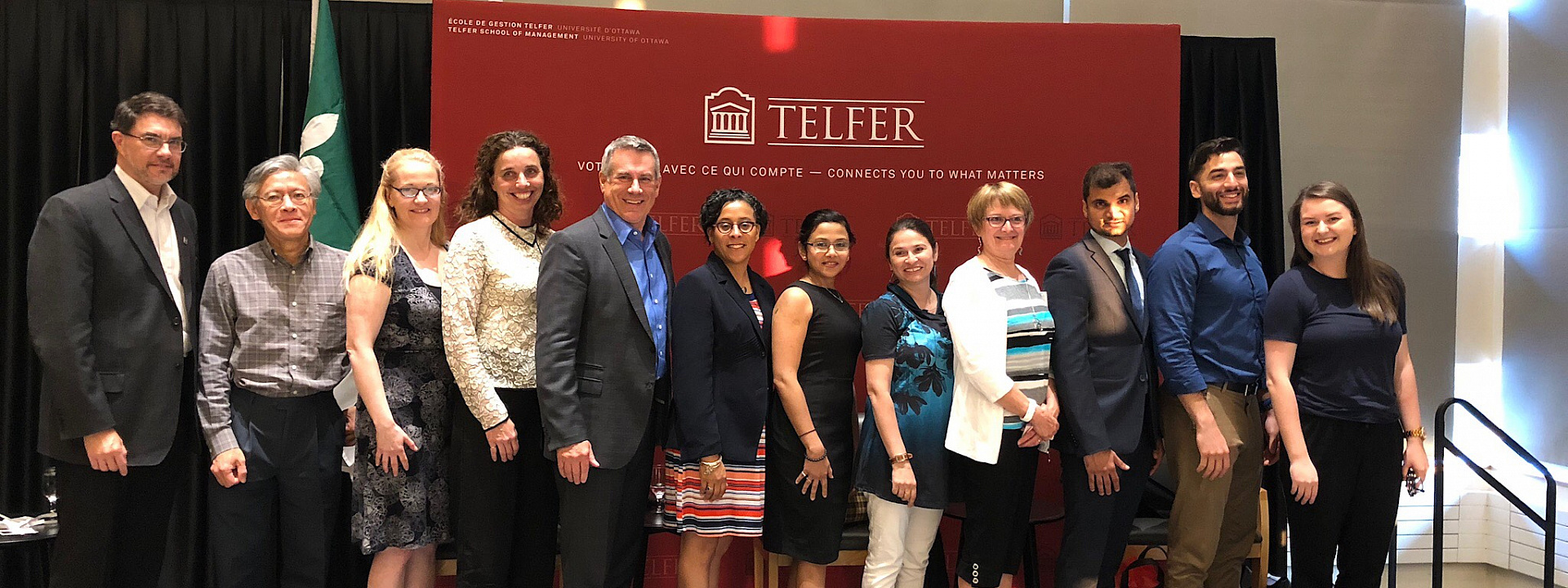On May 24, 2018, three speakers delivered powerful presentations on three unique topics at the Telfer School’s collaborative learning alumni event focused on Emerging Trends in Leadership and Management. The three presentations - cybersecurity, emotional intelligence and diversity & inclusion - were followed by a panel discussion and Q&A for all participants.
Here is a recap of some of the lessons learned from each session.
Diversity and inclusion in the workplace
Justine Hendricks (MBA 2004), Vice-President, Working Capital Solutions Guarantee and Bonding Programs at Export Development Canada
“You can be invited to the party, but not invited to dance”
When understanding the concept of diversity and inclusion, Hendricks is quick to assure us that she is not only talking about gender and ethnicity, but organizational needs to employ a compliment of employees with different professional backgrounds and mindsets which will allow for innovation in the workplace.
Hendricks continued her talk advising that diversity without inclusion is not enough, that inclusion is needed to be successful and that it is tough to achieve within an organization. Companies with inclusion are twice as likely to meet or exceed their goals, six times more likely to be agile and innovative and eight times more likely to achieve a better business outcome.
Throughout her talk, Hendricks repeatedly used the line “You can be invited to the party, but not invited to dance” as a metaphor otherwise saying that there is value in not only listening to employee suggestions but implementing them as well, which a lot of organizations tend not to do. There is value in performing a culture reset, measuring outcomes, setting targets and seeing if change is occurring in key areas.
Cybersecurity and emerging trends: Is someone going to hack my pacemaker?
Mari Teitelbaum (MHA 2010), Vice-President, Tech. & Chief Information Officer, CHEO
Cybersecurity is a very real matter, and public and private organizations consider it to be a priority. Although in the past it was possible to hack a pacemaker, today our knowledge of these possibilities for intrusion makes things much more complicated. Hackers must be more agile and creative and know how to exploit users. After all, as Mari says, the problem is a human one, and it is humans that open the door. Therefore, the solution lies in staff education and awareness.
Although major financial transactions are not occurring at CHEO and in the health sector, the confidentiality of patients and their medical records involves sensitive data that must be protected at all costs. Mari explains that many attempts to access the databases occur every day, but thanks to a prevention and risk management strategy, no intrusion has been possible at her organization.
It is essential to keep the risk in perspective, but the key resides in the concept of shared risk. When she needs to make a decision, Mari says that teamwork is crucial in developing her prevention strategy, and guidelines are made with the board of directors.
Integrating emotional intelligence to navigate through workplace conflict
Manali Haridas Scott, Spiritual Wellness Coach
Emotional intelligence starts with our own self-awareness. That is how Manali begins to explain the difference between intelligence (IQ) and emotional intelligence (EQ). Although both contribute greatly to each person's development, emotional intelligence is what enables us to face multiple challenges each day.
Manali has said multiple times that having continuous negative thoughts will negatively affect a person to the point of inhibiting the brain and its capacity for rational thought. Thus, it is important that we condition ourselves to think positively to maintain a balance and better ability to handle the unexpected and situations that require emotional engagement.
Her advice? Be open and curious, forget old emotional patterns and learn new ones. When facing failure, practise self-discipline and compassion, live in the present moment and move forward, and so on. In short, there are many pieces of advice, but these lessons can be summed up in five factors of success: resolve, record, reconcile, regroup and rejoice.



